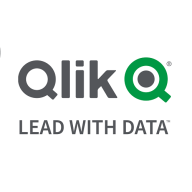

Teradata and Qlik Replicate are leading competitors in the data management solutions category. Teradata appears to have the upper hand in robust features and performance, while Qlik Replicate is recognized for its ease of use and flexibility.
Features: Teradata offers massive parallel processing, linear scalability, and rich analytics capabilities, enabling efficient data insights and adaptability across platforms. Its optimization in query execution and workload management allows for rapid responses to complex queries. Qlik Replicate is known for its change data capture and automated replication processes, supporting multiple database integrations with real-time insights delivery. Its user-friendly interface simplifies complex replication tasks across various data sources.
Room for Improvement: Teradata could improve in areas such as pricing, integration with newer data solutions, and handling of unstructured data. Better user interface experience and enhanced cloud support are also suggested. Qlik Replicate would benefit from enhanced error management, improved API compatibility, and more transparent pricing structure. Users also suggest improvements in integration capabilities.
Ease of Deployment and Customer Service: Teradata provides multiple deployment options including on-premises, public, and hybrid cloud environments, with strong technical support services, albeit with variable response times. Qlik Replicate also offers diverse deployment methods, receiving high customer satisfaction while needing improvements in technical assistance and service communication.
Pricing and ROI: Teradata is praised for high performance and consistent ROI but is expensive, especially for smaller businesses, requiring negotiation to balance costs. Qlik Replicate presents a manageable licensing fee but costs can increase with usage, posing challenges for small enterprises. Both solutions are well-regarded for enhancing business operations and delivering value.
I conducted a cost comparison with the AWS service provider, and this option is much cheaper than the Kinesis service offered by AWS.
Customers have seen ROI with Qlik Replicate because they get their data for analysis faster, enabling quicker decision-making compared to traditional data sourcing methods.
We have realized a return on investment, with a reduction of staff from 27 to eight, and our current return on investment is approximately 14%.
Even priority tickets, which should be resolved in minutes, can take days.
Support response times could be improved as there are sometimes delays in receiving replies to support cases.
The customer support for Teradata has been great.
Customer support is very good, rated eight out of ten under our essential agreement.
The technical support from Teradata is quite advanced.
The system could be scaled to include more sources and functions.
This expansion can occur without incurring downtime or taking systems offline.
Teradata's scalability is great; it's been awesome.
Scalability is complex as you need to purchase a license and coordinate with Teradata for additional disk space and CPU.
I find the stability to be almost a ten out of ten.
The workload management and software maturity provide a reliable system.
It is a core-based licensing, which, especially in the banking industry, results in the system capacity being utilized up to a maximum of 60%.
Currently, there are limited transformations available in Qlik Replicate which could be expanded.
Unlike SQL and Oracle, which have in-built replication capabilities, we don't have similar functionality with Teradata.
If Teradata could provide a list of certified experts, that would be fantastic.
Licensing is calculated based on the machine's total capacity rather than actual usage.
For Qlik Replicate, the setup cost includes the requirement of a server, which represents the hardware cost that must be covered.
Teradata is much more expensive than SQL, which is well-performed and cheaper.
Initially, it may seem expensive compared to similar cloud databases, however, it offers significant value in performance, stability, and overall output once in use.
We spent roughly $295,000 on setup costs.
The most valuable feature of Qlik Replicate is their change data capture feature.
Data retrieved from the system can be pushed to multiple places, supporting various divisions such as marketing, loans, and others.
Teradata's security helps our organization meet compliance requirements such as GDPR and IFRS, and it is particularly essential for revenue contracting or revenue recognition.
The data mover is valuable over the last two years as it allows us to achieve data replication to our disaster recovery systems.
| Product | Market Share (%) |
|---|---|
| Teradata | 0.8% |
| Qlik Replicate | 2.3% |
| Other | 96.9% |


| Company Size | Count |
|---|---|
| Small Business | 9 |
| Large Enterprise | 10 |
| Company Size | Count |
|---|---|
| Small Business | 26 |
| Midsize Enterprise | 12 |
| Large Enterprise | 49 |
Qlik Replicate is a data replication solution for replicating data from one source database to another for business intelligence software. It offers data manipulation and transformations, replication without impacting source databases, and ease of use without needing ETL. The solution is stable and user-friendly, with detailed logging and support.
Qlik Replicate has improved the organization by allowing each team to replicate their data into a single-source data location. The most important feature of Qlik Replicate is its ability to replicate and update records without needing a programmer.
Teradata is a powerful tool for handling substantial data volumes with its parallel processing architecture, supporting both cloud and on-premise environments efficiently. It offers impressive capabilities for fast query processing, data integration, and real-time reporting, making it suitable for diverse industrial applications.
Known for its robust parallel processing capabilities, Teradata effectively manages large datasets and provides adaptable deployment across cloud and on-premise setups. It enhances performance and scalability with features like advanced query tuning, workload management, and strong security. Users appreciate its ease of use and automation features which support real-time data reporting. The optimizer and intelligent partitioning help improve query speed and efficiency, while multi-temperature data management optimizes data handling.
What are the key features of Teradata?In the finance, retail, and government sectors, Teradata is employed for data warehousing, business intelligence, and analytical processing. It handles vast datasets for activities like customer behavior modeling and enterprise data integration. Supporting efficient reporting and analytics, Teradata enhances data storage and processing, whether deployed on-premise or on cloud platforms.
We monitor all Data Integration reviews to prevent fraudulent reviews and keep review quality high. We do not post reviews by company employees or direct competitors. We validate each review for authenticity via cross-reference with LinkedIn, and personal follow-up with the reviewer when necessary.